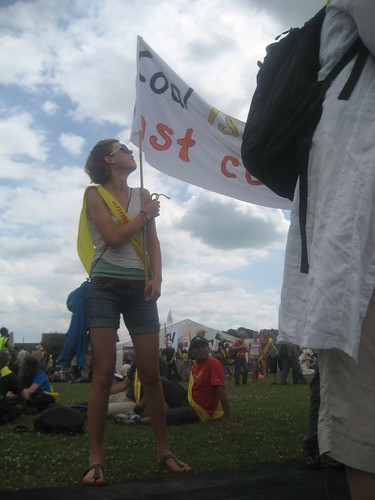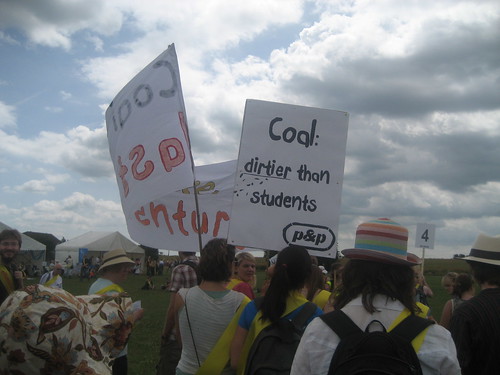On Saturday over 2,000 people came to stand up against a new dirty coal power station on the Kingsnorth site in Kent. A mix of people of all ages, families with babies, old ladies, teenagers, university students all came together to form the mili-band - a direct call to Ed Miliband to hear our collective political will. Back at the fete afterwards we heard a few speakers and a couple of musicians (see the end of this post for a video of Sam Duckworth from Get Cape Wear Cape Fly [apologies for poor quality of the beginning of the video]). I was glad to see there was a decent balance of female-male speakers. And I was also really moved by a speaker from Bangladesh.
Shorbanu Khutun, a survivor of Cyclone Aila from Gabura in Bangladesh, had been brought over by Oxfam especially to speak (through a translator) at the event. She barely made it to the middle of her speech before bursting into tears, but she stood on the small stage, her head high - as if it was all she could do to stand up - and talked. She told us about the flooding, the cyclone that destroyed her land, the loss of all of her possessions and clothes, the subsequent land grab, and how her husband had to go into the jungle to make their living. How he was killed there. She spoke directly about our actions - how it was the developed west that had wrought these changes on her life and about our responsibility - how we are ending people's lives.
"It used to be cold in the winter but it is not anymore. All year it is hot, too hot. The levels of the rivers are always rising and previously we used to grow vegetables and rice, but because of the salination in the water, nothing will grow anymore."
She used her sari to dry her eyes and stood tall again as she carried on talking, only her voice wavered as she told us that she is the proof that climate change kills, and that it is our responsibility to stand up, to speak out. It was powerful stuff.
Speak Out
And then on the journey home, as two people were wheeled out of the train station, unconscious with heatstroke, to a nearby ambulance. I picked up a magazine to pass my journey home, the New Scientist, in which this article caught my eye: "Sea level rise: It's worse than we thought"
"In its 2007 report, the Intergovernmental Panel on Climate Change (IPCC) forecast a sea level rise of between 19 and 59 centimetres by 2100"
Apparently this figure is now thought to be a gross underestimate, "even before it was released, the report was outdated. Researchers now know far more"
Combine sea ice melt, with thermal expansion and the gases released from glacial melt, and you get between a 50cm and 2m rise in sea level. What does that get you? Well it knocks out most of Lincolnshire, much of Cambridgeshire and Norfolk, and a good amount of London when the storm-surge protection is no longer viable.
"most conservative estimates are now higher than the IPCC's highest estimate. [The scientific] community is comfortable expecting at least a metre by the end of this century [...] about 60 million people live within 1 metre of mean sea level, a number expected to grow to about 130 million by 2100."
We are coming up to one of the turning points in the tale that is humanity – in Copenhagen this December governments from all across the world will come together to work out a global deal on climate change. It is recognised that the key to keeping us from 'catastrophic climate change' is the 2°C mark. What does that mean in terms of cutting emissions?
"To obtain a 50% chance of preventing more than 2°C of warming requires [an] 87% cut in global emissions per person. If carbon emissions are to be distributed equally [...] The UK's emissions per capita would need to fall by 91%" (source)
The UK is currently aiming for 60% cuts , when we need 91% cuts by 2050 for a 50/50 chance of securing the survival of the human race.
A 50/50 chance.
Would you get onto a plane with those odds?
But what action can we take? I mean you recycle, right? You turn off lights, and unplug your phone chargers - but you're just one person, what can one person do?
Take action
Speak up. Shout out. Government exists, primarily, to stay in government. They will only ever be as strong as the will of the people. Attend marches, make yourself heard, agitate if it's in you – scale power stations and stop trains – and if you're not up to that – demonstrate. Hold banners, write letters, attend marches, make contact with mainstream organisations like Oxfam, Friends of the Earth and Greenpeace. They have emails you can send, pledges you can make, all of which will get your political will known.
Act out. Grassroots action is change from the other direction. If the government won't build you an eco-town, make your town as environmentally friendly as you can. Organise better recycling and swap meets, work on your councillors and mayors until they provide bicycle lanes, get employers to provide showers and facilities to sort yourself out after a bike to work in the rain, reclaim land for allotments. There's so much you can change with a bottom up approach.
Live right. We do not live sustainable lives. We simply don't. Even if we were to get all of our power from a combination of renewable (on and offshore wind, tide, hot rocks, solar power fields taking up a 1/3 of Britain) and nuclear power stations combined, we would be nowhere near supplying all of our transport, power and consumable needs. If you want to see the science/maths behind that I urge you to watch this video by Dave Mackay, speaking at Warwick University.
What we need is a complete change in the way we live and structure our lives. We cannot afford to continue eating meat in the way we do, building and discarding goods and clothing the way we do, travelling and consuming power in the way to which we've become accustomed. Yes we need massive changes, but they start with little ones. You could eat meat only a couple of times a week, you could buy fruit and veg off the market, you could give your clothes to charity shops, and buy good quality clothing, less often. You could take the train, or the bus, or bike. You could not fly. You could buy solar chargers for your gadgets, or install photo-voltaic panels on your roof. You could cultivate a veg patch. These are not impossible things. These are, in fact, things that between us, me and my mum are doing. We do a lot of bad things too. But it's something, it's a beginning.
We have to make ourselves heard, by the government, by Ed Miliband, in the run up to Copenhagen this December. We can't wait; the decisions and connections are made in advance of these summits. Time is really, truly, running out. For people like Shorbanu's husband, it already has.













1 comment:
Great post! Much better than my rush job on Sunday afternoon :)
Post a Comment